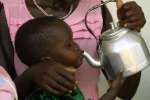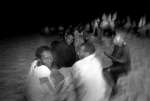- Text size
 |
|  |
|  |
| 
- Français
Young stowaway hopes to stop running and finally find a home
News Stories, 14 August 2007

JAKARTA, Indonesia, August 14 (UNHCR) – At the age of 18, Elias Sagaad has been through more adventures than most men four times his age. He first became a refugee at the age of nine, and then lost his nationality as he fled from country to country.
After turning stowaway on an ocean-going ship, he washed up four years ago in Indonesia, half a world away from his native Ethiopia. Now the resilient young man hopes his next move will be a happier one, and that he can soon start a new life in a Western country on yet another continent.
Elias was born to parents who were already on the run – Ethiopians in Eritrea. After the premature death of his father, a former Ethiopian soldier, Elias grew up in poverty in Eritrea, where he says he and his mother were discriminated against because of their nationality. After a long struggle, Eritrea had broken away from Ethiopia, gaining its independence in 1989.
In 1999, border clashes between Eritrea and Ethiopia turned into a full-scale war and Elias was on the run again, in fear for his life.
"Hundreds of people died due to the war in my country," Elias says, now safe in the Indonesian capital of Jakarta. "Everybody left. I begged my mother to go too. But she didn't want to leave." Though still a child, Elias joined a neighbour and fled to Djibouti, "because I felt my life was in danger."
But that Horn of Africa country also proved to be only a temporary refuge. In 2003, Djibouti ordered all illegal immigrants to leave – Elias fell into that category.
As he sat by a jetty in Djibouti, Elias asked himself where he could go to find a new life. Then he realized the answer was right in front of him – a cargo ship moored in the harbour. He crawled up the anchor chain and hid in a room deep down in the ship for several days until hunger drove him out.
"I was caught by the crew because I had left my dirty footprints on the kitchen floor," Elias recalls. "But the captain was very kind. He asked me to take a bath and gave me new clothes."
Finally, he says, the captain told him to swim for shore when they reached the Indonesian port of Surabaya. From there, he walked to a church where an Indonesian woman gave him money to get to Jakarta by train.
With a filthy face and clothes, he scared away the very people he now needed. "Maybe people thought that I was crazy, so it was very difficult to ask someone for help," Elias explains.
But finally a hotel security guard steered him to Jakarta's Tahan Abang section, where there were many other Africans. An African benefactor gave him a place to stay and steered him towards the UN refugee agency.
Effectively stateless – with no way to obtain either Ethiopian or Eritrean citizenship – Elias was granted refugee status and now gets a small monthly subsistence allowance from UNHCR.
"I was very happy and very grateful to UNHCR because, without UNHCR's assistance, maybe I would not have survived," says Elias.
Despite having received only a Grade Three education in Eritrea, Elias now studies English, computer technology and painting at the refugee centre in Jakarta. After so many years on his own, he uses his UNHCR allowance to rent a room from a kind landlady who treats him like a son.
Still, he finds life in limbo difficult. "I want to live in a place that I can call home, I want to have a nationality and I also want to have a job," he says. "I am really hoping that there is a country which would accept me," he adds, referring to UNHCR's attempts to find a resettlement country for him.
"It would be very difficult for Elias to go back to Eritrea or Ethiopia, as he no longer has a home there," says Shinji Kubo, senior regional protection officer at UNHCR Jakarta. "We were all saddened to learn recently that his mother had passed away in Eritrea some time ago; Elias has no family there either."
So now the future of this young man lies with foreign decision-makers. "We will not give up in our attempts to find a new home and country for Elias," says Kubo, "and hope that our resettlement efforts will soon prove successful for him."
By Anita Restu in Jakarta, Indonesia








































